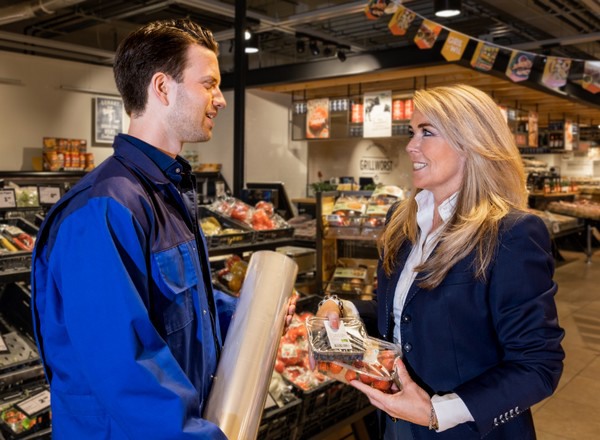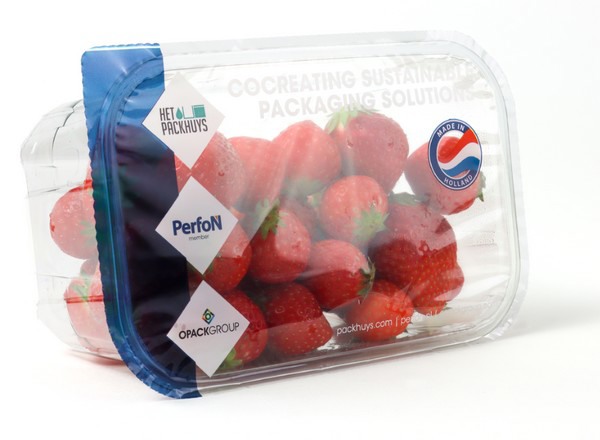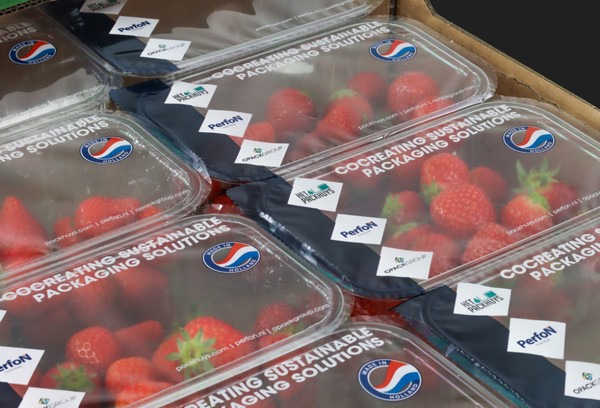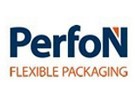"To prevent food waste, we must use the correct packaging material for the correct product," begins Ellen Schreur, an account manager at Perfon. This Dutch company is part of Opackgroup (formerly Oerlemans Packaging Group). Perfon focuses on flow pack and top seal foils, perforated or not, primarily for the fruit and vegetable sector. When choosing packaging, sustainability, extending shelf life, and preventing food waste are increasingly important.
That involves careful consideration. You do not get the desired environmental result if less plastic use leads to more food waste. Ellen cites the plastic wrap around cucumbers as an example. Many consider this unnecessary, but it can lengthen shelf life by up to ten days. She sees a similar trend with apples. Using cardboard instead of plastic shortens their shelf life by about three days. "That's hugely problematic for shelf life and food waste."

Product manager Piet van den Oord (Oerlemans Plastics Horticulture) and account manager Ellen Schreur in discussion in a supermarket's fruit and vegetable aisle.
Sustainability and packaging, thus, sometimes prove tricky. So, Perfon dives into such issues to inform customers about, say, legislation or single-use plastic's pros and cons. Ellen sees that clients have many questions about sustainability.
Less material
One thing you can do to become sustainable is to use less material. That means using thinner films, and Perfon focuses on using that for both flow pack and top seal. Ellen points out that this requires a careful approach. For instance, can the packaging machine handle the thinner films? "Sometimes, when using a different film, a machine is always idle. You don't want that; it’s less profitable. Then it's better to use a slightly thicker film," she says.
But also: is the film sturdy enough for the packaged product? "Fruits and vegetables are often quite heavy, so the film must sometimes be of a certain thickness and sturdiness. When shopping, you want your tomatoes to stay together, not roll around loose in your shopping bag." By extensively testing trial rolls, Perfon determines how much less materials a customer can use.
Taking surplus film back
The material type contributes to the sustainability goal too. Ellen sees that for flow packs, people are increasingly using eco-friendly BOPE - which is also slightly stronger - instead of the more common BOPP. She points out that the solutions can be customized: "Any thickness and all sizes are possible." Plus, with sustainability in mind, Perfon takes back films their customers no longer use because Ellen has noticed quite a lot of unused film was often thrown away. "We're happy to take back BOPP films for recycling and can agree on a price, depending on the market and printing," she explains.
 A strawberry punnet sporting Perfon's recyclable Topseal film.
A strawberry punnet sporting Perfon's recyclable Topseal film.
Schreur says fluctuating prices are a given for all films. "Price is never a stable factor in the packaging world and constantly changes for raw materials. Oil and fuel prices fluctuate quite significantly, something on which foil raw material prices also depend."
Not yet set up
The Perfon assortment includes biodegradable and bio-based films too. "However, the problem is it takes longer to compost biofilms than household biowaste streams. So, the films are sieved out and still incinerated. Our collection and composting system isn't properly set up for that yet," admits Ellen.
Perfon markets perforated - hot needle, macro, and laser - film for the food and non-food sectors. "That perforation regulates fruit and vegetables, which are still alive and breathing, respiration which maximizes their shelf life. The pattern is customized per product," says Ellen.

Food safety and sustainability
She notes that food safety is paramount in the fruit and vegetable sector. Perfon guarantees that, thanks to BRC AA+, Ecovadis Goud, and ISO 26000 certification. Also, the weather affects deliveries. "Film is needed later in the process, and when it's sunny for a few days, we suddenly get an influx of orders." Perfon tries to anticipate that and inform customers as best it can to avoid long delivery times.
That is vital; the account manager points out. Clients obviously do not want their production process to grind to a halt. Perfon can, therefore, in consultation, keep products in stock for customers who then do not have to worry about putting their orders in late. Also, since Perfon is part of the Opackgroup, it has access to film production and printing facilities. "In-house production ensures flexibility and easy communication about, for instance, delivery times," Ellen concludes.
For more information: 
Ellen Schreur
Perfon
Tel.: +31 (0) 547 27 6100
Mob.:+31 (0) 6 82 68 70 45
[email protected]
www.perfon.nl
